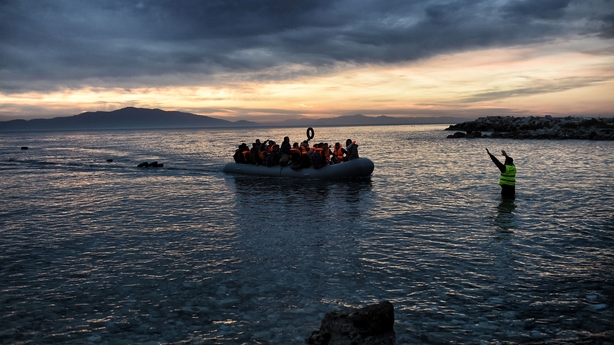An agreement between the European Union and Turkey to try to halt the flow of migrants and refugees crossing the Aegean Sea has come into effect.
50 or so migrants in a blue rubber boat were among the first to arrive on the Greek island of Lesbos on day one of the deal.
Witnesses saw three boats arrive within an hour in darkness in the early hours of this morning. Two men were pulled out unconscious from one of the boats amid the screams of fellow passengers and were later pronounced dead.
Twelve boats had arrived on the shoreline near the airport by 6am, a police official said. A government account put the number of arrivals across Greece in the past 24 hours at 875 people.
Under the European Union deal with Turkey, all migrants and refugees, including Syrians, who cross to Greece illegally by sea from today will be sent back to Turkey once they are registered and their asylum claims have been processed.
That is expected to take effect from 4 April, by which time Greece must have in place a fast-track process for assessing asylum claims.
The EU has pledged to help Greece set up a task-force of some 4,000 staff including judges, interpreters, border guards and others to manage each case individually.
"The agreement comes into effect from today. Greek authorities have done whatever is necessary and will continue to do what it promised," George Kyritsis, a government spokesman for the refugee crisis, said.
"Other parties (to the agreement) should also do their part," he said, referring to Greece's EU partners and Turkey.
In return, the EU will take in thousands of Syrian refugees directly from Turkey and reward it with more money, early visa-free travel and progress in its EU membership negotiations.

Doubts remain about whether the deal is legal or workable. It was not clear what would happen to the tens of thousands of migrants and refugees already in Greece.
It was too early to say if the deal would be effective, a senior coastguard official said. "We haven't yet seen the terms of the deal properly," said Antonis Sofiadelis, head of the coastguard operations on Lesbos.
"But if returns begin I believe it will act as a deterrent. They (migrants) won't want to pay $1,000-2,000 to a smuggler. Everything depends on whether Turkey implements its part of the deal.
"What we're doing on our part is boosting the asylum process."
Authorities in Lesbos began removing refugees and migrants from the island yesterday to make space for new arrivals. The island has a capacity to host 3,500 people at a place set up to register arrivals.
At least 144,000 people, mostly Syrians, Iraqis and Afghans, have arrived in Greece so far in 2016 according to UN refugee agency data. About 60% were women and children.
Of those people, more than half landed on Lesbos, the island on the frontline of Europe's biggest migration crisis since World War Two.
Few, if any, had planned to stay in the country, seeking instead a route to northern Europe where more support and jobs are available than in Greece, which is in the grip of an economic crisis.
But border closures along the main route north through the Balkans have meant at least 48,000 people are stranded in Greece, in camps and ports across the country. About 12,000 people remain at a squalid tent camp near the Macedonian border hoping to cross.

